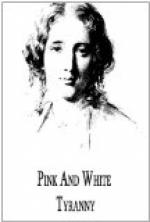“Yes, so they are,” said John, delighted to see her smile again; “they seem adapted to that, and I don’t doubt you’ll make a brilliant affair of it, Lillie.”
“Trust me for that, John,” said Lillie. “I’ll show the Follingsbees that something can be done here in Springdale as well as in New York.” And so the great question was settled.
CHAPTER XV.
THE FOLLINGSBEES ARRIVE.
Next week the Follingsbees alighted, so to speak, from a cloud of glory. They came in their own carriage, and with their own horses; all in silk and silver, purple and fine linen, “with rings on their fingers and bells on their toes,” as the old song has it. We pause to caution our readers that this last clause is to be interpreted metaphorically.
[Illustration: THE FOLLINGSBEES.]
Springdale stood astonished. The quiet, respectable old town had not seen any thing like it for many a long day; the ostlers at the hotel talked of it; the boys followed the carriage, and hung on the slats of the fence to see the party alight, and said to one another in their artless vocabulary, “Golly! ain’t it bully?”
There was Mr. Dick Follingsbee, with a pair of waxed, tow-colored moustaches like the French emperor’s, and ever so much longer. He was a little, thin, light-colored man, with a yellow complexion and sandy hair; who, with the appendages aforesaid, looked like some kind of large insect, with very long antennae. There was Mrs. Follingsbee,—a tall, handsome, dark-eyed, dark-haired, dashing woman, French dressed from the tip of her lace parasol to the toe of her boot. There was Mademoiselle Therese, the French maid, an inexpressibly fine lady; and there was la petite Marie, Mrs. Follingsbee’s three-year-old hopeful, a lean, bright-eyed little thing, with a great scarlet bow on her back that made her look like a walking butterfly. On the whole, the tableau of arrival was so impressive, that Bridget and Annie, Rosa and all the kitchen cabinet, were in a breathless state of excitement.
“How do I find you, ma chere?” said Mrs. Follingsbee, folding Lillie rapturously to her breast. “I’ve been just dying to see you! How lovely every thing looks! Oh, ciel! how like dear Paris!” she said, as she was conducted into the parlor, and sunk upon the sofa.
“Pretty well done, too, for America!” said Mr. Follingsbee, gazing round, and settling his collar. Mr. Follingsbee was one of the class of returned travellers who always speak condescendingly of any thing American; as, “so-so,” or “tolerable,” or “pretty fair,”—a considerateness which goes a long way towards keeping up the spirits of the country.
“I say, Dick,” said his lady, “have you seen to the bags and wraps?”
“All right, madam.”
“And my basket of medicines and the books?”
“O.K.,” replied Dick, sententiously.




